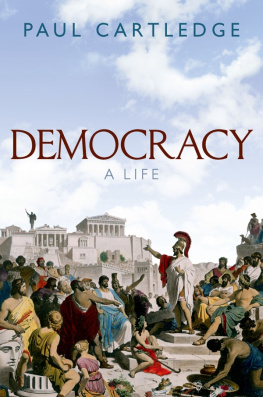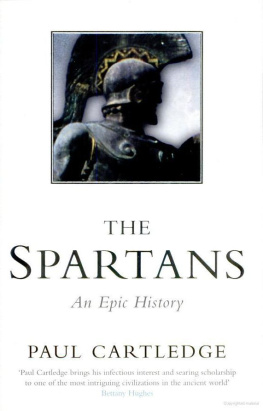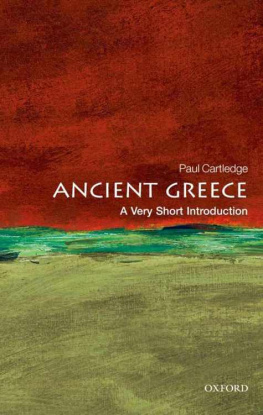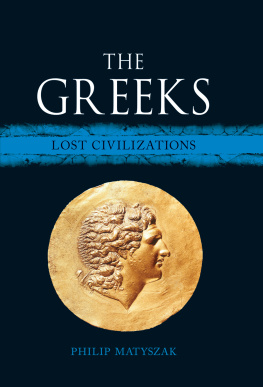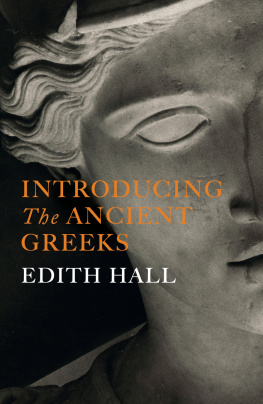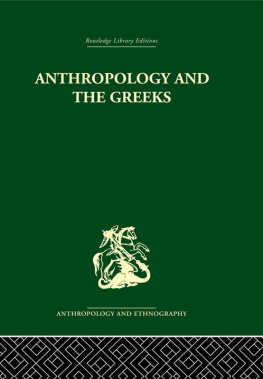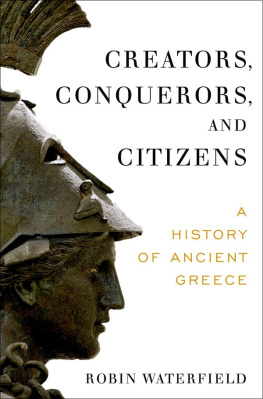THE GREEKS
Paul Cartledge is Professor of Greek History, Chairman of the Faculty of Classics, and a Fellow of Clare College, at the University of Cambridge. Publications include most recently The Greeks: Crucible of Civilization (BBC Worldwide, 2001) and Spartan Reflections (Duckworth/University of California Press, 2001).
Cartledges The Greeks is bracingly enthusiastic with inter-disciplinary influences and interests.
The Sunday Times
the lively and succinct development of many ancient and modern arguments makes The Greeks a welcome and timely contribution to a number of continuing and important debates
Times Literary Supplement
it can be warmly recommended as a source of new insights and new approaches.
Bryn Mawr Classical Review
I know of no better book with which to introduce this portrait of self and others to students.
Greece & Rome
a study of the rise of a mentality, written in brilliant style, important, sometimes iconoclastic
Il pensiero politico
To the St Pauls Schools, London, and
the Faculty of Classics, University
of Cambridge
The Greeks
A Portrait of Self and Others
SECOND EDITION
PAUL CARTLEDGE


Great Clarendon Street, Oxford 0x2 6 DP
Oxford University Press is a department of the University of Oxford. It furthers the Universitys objective of excellence in research, scholarship, and education by publishing worldwide in
Oxford New York
Auckland Bangkok Buenos Aires Cape Town Chennai Dar es Salaam Delhi Hong Kong Istanbul Karachi Kolkata Kuala Lumpur Madrid Melbourne Mexico City Mumbai Nairobi So Paulo Shanghai Singapore Taipei Tokyo Toronto
with an associated company in Berlin
Oxford is a registered trade mark of Oxford University Press in the UK and in certain other countries
Published in the United States
by Oxford University Press Inc., New York
Paul Cartledge 1993, 2002
The moral rights of the author have been asserted
Database right Oxford University Press (maker)
First published 1993 as an Oxford University Press paperback and simultaneously in a hardback edition Reissued 2002
All rights reserved. No part of this publication may be reproduced, stored in a retrieval system, or transmitted, in any form or by any means, without the prior permission in writing of Oxford University Press, or as expressly permitted by law, or under terms agreed with the appropriate reprographics rights organizations. Enquiries concerning reproduction outside the scope of the above should be sent to the Rights Department, Oxford University Press, at the address above
You must not circulate this book in any other binding or cover and you must impose this same condition on any acquirer
British Library Cataloguing in Publication Data
Data available
Library of Congress Cataloging in Publication Data
Cartledge, Paul.
The Greeks: a portrait of self and others / Paul Cartledge.
Includes bibliographical references and index.
1. National characteristics, Greek. 2. Difference (Philosophy).
3. GreeceCivilizationTo 146 B.C. I. Title.
938dc20 DF78.C28 1993 92-45898
ISBN 0-19-280388-3
1 3 5 7 9 10 8 6 4 2
Printed in Great Britain by
Clays Ltd., St Ives plc
Acknowledgements
I HAVE to thank, first, the Oxford University Press, especially the academic editors of the OPUS series and its editorial director Ms Catherine Clarke, for the challenge they posed me by commissioning this book. Secondly, I am in the debt of David Konstan of Brown University, and Lene Rubinstein of Churchill College, Cambridge, who quite out of the line of normal duty subjected my penultimate and ultimate drafts respectively to the most searching and fruitful cross-examination. Thirdly, I have, I trust, profited from the observations of Oxfords peculiarly acute and assiduous anonymous reader. But above all this book is owed to the successive cohorts of Cambridge undergraduates who endured my The Greeks and the Other lectures between 1989/90 and 1992/3, and to the friends and colleagues who helped me with the teaching of the course: Peter Garnsey, Penny Glare, Simon Goldhill, Edith Hall, Jonathan Hall, John Henderson, Geoffrey Lloyd, Paul Millett, Neville Morley, Sitta von Reden, Dorothy Thompson, and (by no means least) Jonathan Walters. It is to the Faculty which they represent or have represented that this book is dedicated, in a spirit not of alienation but of homonoia, like-minded identification; as it is also to the St Pauls Schools, my other principal educational preoccupation, in the same spirit.
P.A.C.
Trumpington
September 1992
Acknowledgements for Second Edition
Catherine Clarke has kindly kept a watchful maternal eye over the volume since it was first published eight years ago, but the idea for the second edition has come from a successor editor at the OUP, George Miller, to whom I am indebted also for much wise advice. My new colleague Robin Osborne, the Presss anonymous reader for the first edition, has compounded my debt by reading and advising on the new illustrated Entracte below. I should also like to thank warmly the three translators of the revised English edition of The Greeks into respectively German and Japanese: their names will be found in the first note to the New Afterword.
Trumpington
October 2001
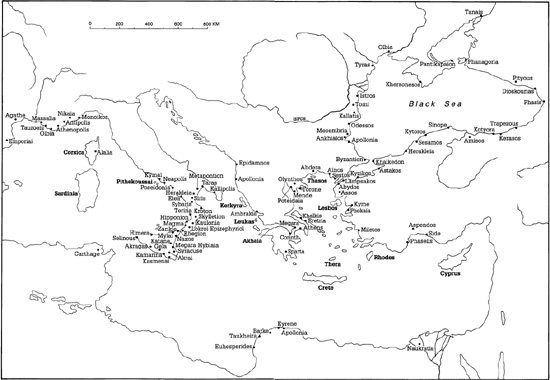
Hellas: The Greek World c.400 BCE

The Aegean Heartland
Chronological Reference Points
508/7 | Democracy founded at Athens. |
| Battle of Marathon. |
| Death of Persian Great King Darius, succeeded by Xerxes (486-465). |
First competition in comic drama at Athens. |
484? | Birth of Herodotus (d. 425?). |
480-479 | Expedition of Xerxes against Greece. |
| Greek naval victory at Salamis; Xerxes withdraws. |
| Further Greek victories, on land at Plataia, by land and sea at Cape Mykale in Ionia. End of Persian Wars. |
| First Athenian Sea-League established against Persian threat. |
| Aeschylus Persians (Perikles as impresario). |
Early 460s | Victory of Kimon at Eurymedon in south-west Anatolia removes Persian presence from Aegean. |
| Death of Xerxes; accession of Artaxerxes I (to 424). |
461-451 | Further democratic developments at Athens. |
| Reforms of Ephialtes and Perikles (downgrading of Areiopagos, institution of Peoples Court with state-pay for jurors). |
| Oresteia trilogy of Aeschylus. |
451/0 | Perikles Citizenship Law. |
460? | Birth of Thucydides (d. 400?). |
460-445 | |
Next page


